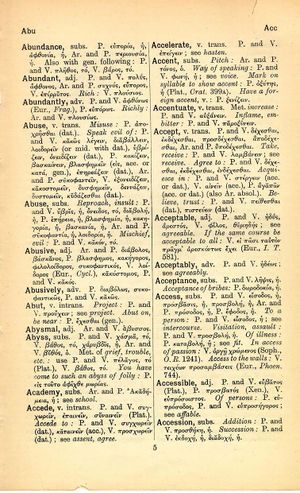abusive: Difference between revisions
ἀσκεῖν περὶ τὰ νοσήματα δύο, ὠφελεῖν ἢ μὴ βλάπτειν → strive, with regard to diseases, for two things — to do good, or to do no harm | as to diseases, make a habit of two things — to help, or at least, to do no harm
(1) |
m (Text replacement - "(|thumb)\n(\|link=)" to "$1$2") |
||
| Line 1: | Line 1: | ||
{{Woodhouse1 | {{Woodhouse1 | ||
|Text=[[File:woodhouse_5.jpg|thumb | |Text=[[File:woodhouse_5.jpg|thumb|link={{filepath:woodhouse_5.jpg}}]]'''adj.''' | ||
|link={{filepath:woodhouse_5.jpg}}]]'''adj.''' | |||
Ar. and P. [[διάβολος]], [[βάσκανος]], P. [[βλάσφημος]], [[κακήγορος]], [[φιλολοίδορος]], [[συκοφαντικός]], V. [[λοίδορος]] (Eur., ''Cycl.''), [[κακόστομος]], P. and V. [[κακός]]. | Ar. and P. [[διάβολος]], [[βάσκανος]], P. [[βλάσφημος]], [[κακήγορος]], [[φιλολοίδορος]], [[συκοφαντικός]], V. [[λοίδορος]] (Eur., ''Cycl.''), [[κακόστομος]], P. and V. [[κακός]]. | ||
Revision as of 17:05, 18 May 2020
English > Greek (Woodhouse)
adj.
Ar. and P. διάβολος, βάσκανος, P. βλάσφημος, κακήγορος, φιλολοίδορος, συκοφαντικός, V. λοίδορος (Eur., Cycl.), κακόστομος, P. and V. κακός.
Latin > English (Lewis & Short)
ăbūsīvē: adv. abusivus.
I By an improper use, Quint. 8, 6, 35; 9, 2, 35.—
II Slightly, not in good earnest, Amm. 24, 4.
Latin > French (Gaffiot 2016)
ăbūsīvē,
1 par catachrèse, métaphoriquement : Quint. 8, 6, 35
2 de façon insolite, abusive : Mamert. An. 1, 6 ; Amm. 24, 4, 19.
Latin > German (Georges)
abūsīvē, Adv. (abusivus), I) durch uneigentlichen Gebrauch, uneigentlich, katachrestisch (Ggstz. proprie), Quint. u.a. – II) nicht recht im Ernst, nur so leichthin, Amm. 24, 4, 19.
Latin > English
abusive ADV :: loosely, catachresisly, by loose/improper use of language/term/metaphor

